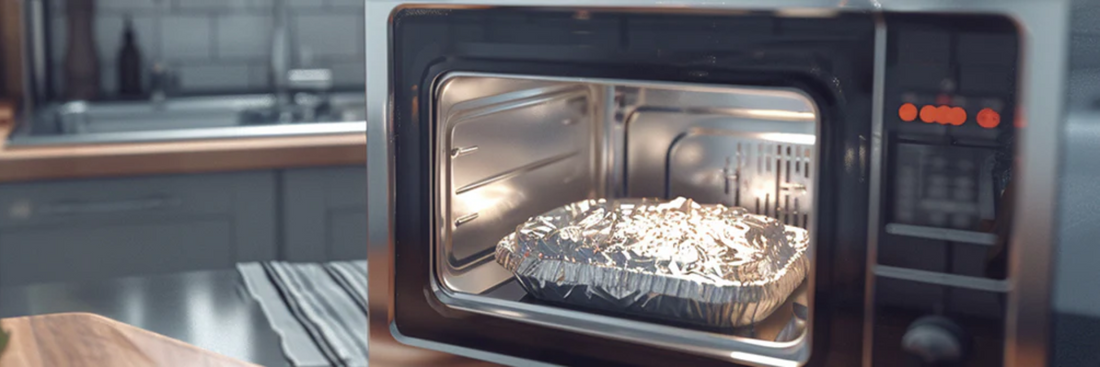When using aluminum foil to hold or cook food, many of us wonder if it can go in the microwave. Some people believe that it cannot be used in this appliance. Let’s find the answer to the question, “Can aluminum foil go in the microwave?” in the article below!
Can Aluminum Foil Go in the Microwave?
In certain appropriate cases, aluminum foil (also known as tin foil) can be used in the microwave if safety guidelines are followed.
Aluminum foil can still be used in the microwave in certain situations. Specifically:
- You can use a small amount of aluminum foil in the microwave.
- Some utensils and trays contain a permissible amount of aluminum foil, making them safe to use in the microwave. Users should carefully read the manufacturer's product usage instructions.
According to guidelines from the USDA, users should follow these safety rules when using aluminum foil in the microwave:
- Only use new foil with a smooth surface, free of wrinkles, tears, or discoloration (wrinkled foil can cause arcing and sparks when microwaved).
- Use only a small amount of foil to cover no more than ¼ of the food’s surface.
- Do not place the foil close to the microwave walls to avoid causing a fire.
- If the microwave has metal racks or a metal turntable, do not use aluminum foil containers for food.
- Ensure that the foil in the microwave does not cover or touch the appliance's racks or turntable.
- If you see arcing (sparks) while the appliance is operating, immediately remove the aluminum foil shield and transfer the food to a microwave-safe container.
Can Aluminum Foil Catch Fire in the Microwave?
Aluminum foil can cause sparks inside the microwave if used incorrectly. These sparks can ignite materials around the foil, potentially causing a fire. Always follow the instructions in the user manual and be extremely cautious. If the manual does not provide guidance on using foil, do not use foil in the microwave.

What You Should NEVER Do
Even if a microwave allows some use of aluminum foil, there are strict rules to follow:
1. Do Not Place Aluminum Foil Directly on the Microwave Walls
- If foil touches the metal walls of the microwave, it can cause immediate sparking and damage the appliance.
2. Do Not Use Wrinkled or Crumpled Foil
- Crumpled foil increases the risk of sparks, which can lead to fires. Always keep foil flat and smooth if you must use it.
3. Do Not Completely Wrap Food in Aluminum Foil
- If food is completely wrapped, microwaves cannot penetrate, leading to uneven heating and potential sparking.
4. Do Not Put Aluminum Foil Near Other Metal Objects
- If aluminum foil is placed near another metal object (like a metal rack or dish), the two metals can create sparks.
Risks of Not Following Safety Guidelines
If you do not adhere to the above rules, you may encounter risks such as:
- Food may not heat properly because aluminum foil reflects microwaves, preventing the temperature from reaching the food.
- There is a risk of fire, explosions, and overall unsafe usage, which can even damage kitchen appliances.
Alternatives to Aluminum Foil for Microwave Use
When replacing aluminum foil in the microwave, you can use the following safe and appropriate materials:
- Ceramics: Use ceramics that have a safe temperature range for microwave use.
- Glass: Pans, dishes, or pots made from glass are safe for microwave use.
- Heat-resistant plastic: Some heat-resistant plastic products can be used in the microwave, but check the instructions and safety guidelines carefully.
- Non-porcelain ceramics: Products made from non-porcelain ceramics can also be safely used in the microwave.
- Parchment paper: Parchment paper is a good alternative to aluminum foil as it does not reflect microwaves. You can use parchment paper to line baking trays or wrap food before microwaving.
- Sugarcane containers: Sugarcane containers are a natural material that can withstand temperatures up to 250°C. You can use sugarcane containers to hold food or bake in the microwave.
- Butcher paper: In some cases, you can use butcher paper. Butcher paper can be used in the oven, but it's generally recommended for lower temperatures, typically under 300℉.
Other Tips for Using Aluminum Foil
In addition to following safety rules for microwave use, there are other important tips for using aluminum foil to cook and hold food:
- Do not use aluminum foil with acidic foods like vinegar, tomatoes, and lemons. These foods can cause chemical reactions that are harmful to health.
- Do not use aluminum foil at excessively high temperatures, as it can cause burning, scorching, and safety issues.
- The dull and shiny sides of aluminum foil are a result of the manufacturing process and do not affect its usage quality.

By following these guidelines, you can safely use aluminum foil in various cooking methods, including in the microwave, while ensuring both food safety and the longevity of your kitchen appliances.
Conclusion
The article provides detailed answers to the question, "Can aluminum foil go in the microwave?" To maintain the quality of your food and ensure safety while cooking, it's important to choose high-quality aluminum foil products and carefully read the manufacturer's instructions before use!
Related Articles:




